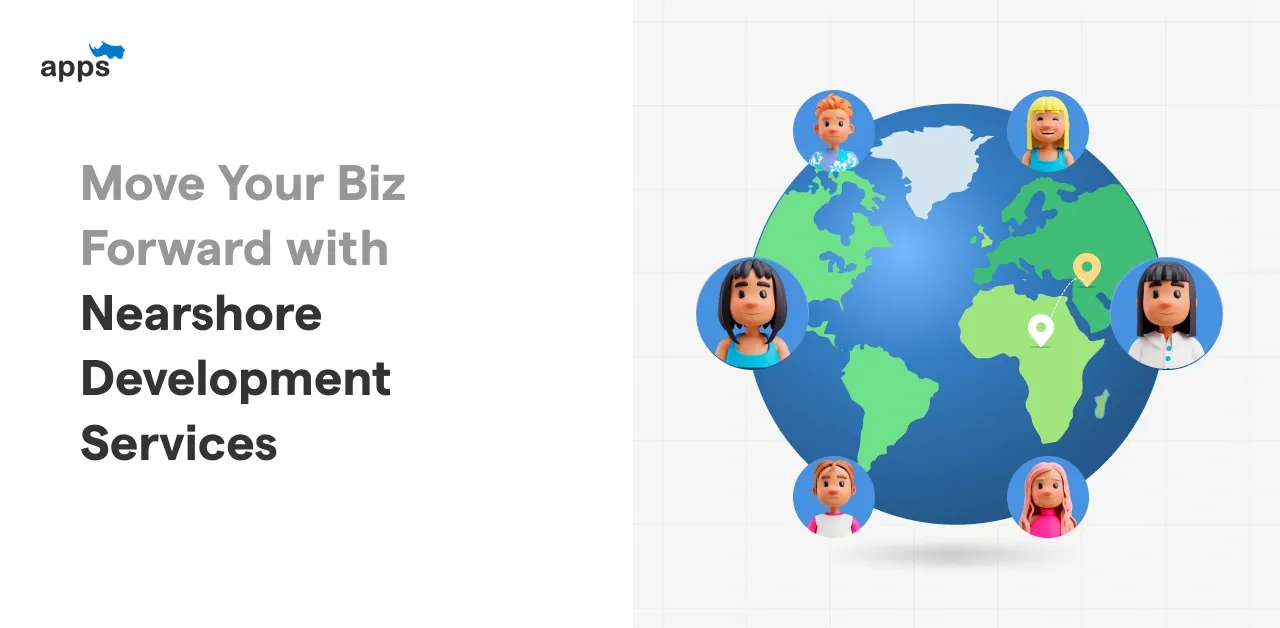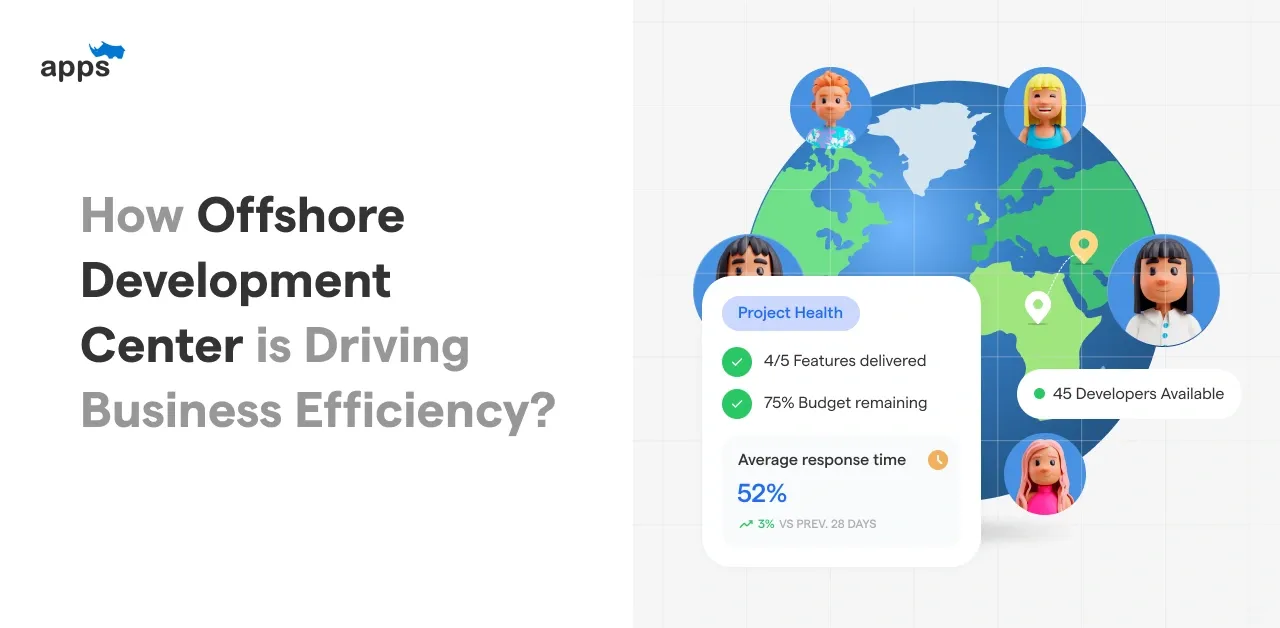- Introduction
- Benefits of Offshore Development
- Considerations Before Adopting Offshore Development
- Potential Risks and Challenges
- Case Studies and Success Stories
- Conclusion
- Frequently Asked Questions (FAQs)
Table of Contents
Is Offshore Development the Right Strategy for Your Company?

Introduction
Getting projects done in time with guaranteed success is a hefty business. Chances are the existing team of professionals might not be the best shot for the task.
This is where offshore development steps in. This strategy has been applied by businesses from all domains to get their projects done on time by a team of experts at a reasonable cost.
In the case of offshore development, companies get to hire a set of individuals who have a significant amount of experience and knowledge required for their respective projects for a limited time. The hired team works tirelessly and gives their level best on the assigned task, resulting in positive outcomes.
Offshore development is the go-to-choice for entrepreneurs as it is not only a cost-effective way, but the hired employees do not require additional benefits that permanent employees would usually do.
Integrating a team of professionals into your existing team also brings a much-needed change and outlook that is beneficial both for the team and the project.
How about we go through the different aspects of offshore development and understand the strategic hold businesses can obtain from this by going ahead with this unique solution.
Benefits of Offshore Development
When it comes to benefits, offshore development has over a ton of them to offer.

The following section delves into the numerous benefits offshore development has in store for businesses of all shapes and sizes:
Cost savings and cost-effectiveness
Besides offshore development, businesses have the option to hire permanent employees that would do the job for them.
This hiring process would require going through a range of portfolios and interviews and then discussing the project requirements and so on. This process is exhausting both in terms of time and money.
On the other hand, businesses can easily go for companies that have professionals in store that have expertise and experience in working on projects similar to yours. This makes offshore development the ideal and cost-effective way rather than the traditional practice.
Employees hired through traditional practice also demand other benefits like insurance and other allocations, which offshore development centers don’t prove yet again to be the better option than the rest of them.
Access to a larger talent pool
Offshore development provides access to a global talent pool. Companies can tap into a diverse range of skilled professionals who have expertise in various technologies and domains.
This enables businesses to find the right talent for their projects, ensuring high-quality work and innovative solutions.
Increased productivity and efficiency
Offshore development teams are often highly skilled and experienced in delivering projects on time and meeting deadlines.
They are focused on specific tasks, allowing for higher productivity and efficiency. Moreover, different time zones can enable 24/7 work cycles, ensuring continuous progress on projects.
Faster time to market
With offshore development, companies can expedite the development process and bring products and services to market faster.
Offshore teams are experienced in working on tight schedules and can handle multiple projects simultaneously.
This quick turnaround time can give businesses a competitive edge by enabling them to seize market opportunities more rapidly.
Considerations Before Adopting Offshore Development
Considering these factors is crucial before adopting offshore development to minimize the challenges and risks that may arise. By addressing these considerations upfront, companies can ensure a successful and secure collaboration with their offshore teams.
Cultural and language barriers
Offshore development often involves working with teams from different countries or regions, which may present cultural and language differences.
These barriers can affect communication, collaboration, and understanding. To overcome these challenges, it is important to establish effective channels of communication, encourage open dialogue, and promote cultural understanding.
Time zone differences and communication challenges
Offshore development may involve working with teams in different time zones, which can pose challenges in terms of coordination and communication.
It is essential to establish clear communication protocols, set overlapping working hours, and leverage technology tools to ensure smooth collaboration and minimize delays.
Data security and intellectual property protection
When outsourcing work to an offshore team, companies need to consider data security and intellectual property protection.
It is crucial to establish robust security measures, define appropriate access controls, and ensure that all contractual agreements include provisions for protecting sensitive information and intellectual property.
Legal and regulatory implications
Centers offering offshore development services are usually located overseas. Integrating with them would mean agreeing to or complying with their regulatory standards as well.
It is advised to go for companies that do not affect the legal and regulatory frameworks of your projects.
One can even consult a legal expert to acquire more knowledge about the legal demands of the offshore development center businesses are thinking about going ahead with. This consultation will eliminate any potential risk and guide you throughout the process of development.
Potential Risks and Challenges
While offshore development offers numerous benefits, it is essential to be aware of the associated risks and challenges. By proactively addressing these risks and implementing effective mitigation strategies, companies can maximize the advantages of offshore development while minimizing potential pitfalls.
Lack of control and oversight
Since the whole concept of offshore development requires transferring the credentials of a particular project to the hired team, it might not be the best option for some organizations.
There can be an absence of updates and information regarding the overall development procedure the project is undergoing.
Businesses might have some concerns and issues regarding the project that might not be addressed on time.
To fix this, it is important to establish a regular source of communication between the two parties. This source of communication can be physical meetings or virtual calls.
A regular source of communication also helps in establishing trust and transparency between the two parties.
Quality and reliability concerns
Individuals at offshore development centers are mostly professionals who work on a project basis.
Therefore, some organizations might be hesitant to transfer the entire workload to people they have never worked with before.
This concern majorly arises because every organization's vision is unique and so are their project requirements.
In order to make sure that you are making the right decisions, entrepreneurs should go for offshore development centers that deal with a similar domain as your organization.
Project management difficulties
Another factor that makes offshore development centers not the first choice for task completion is the difficulty in project management. Offshore development centers are mostly located overseas and have restraints like time zones and cultural differences involved in it.
Companies willing to work with offshore development centers must keep these restraints in mind and make their choice accordingly. After making the selection, businesses must be able to actively coordinate and collaborate with the offshore development team to overcome these difficulties.
Potential negative impact on the local workforce
Offshore development centers have also been held responsible for not giving opportunities to local jobs and workforce.
Companies must look into their local job market first and see whether their project demands can be met by them or not. This process will guarantee that no local talent is missed out on the process and minimize negative consequences.
Case Studies and Success Stories
For selecting the right offshore development center, going through case studies and success stories is an option that works best most of the time. Through success stories, businesses can analyze their previous works, and to some extent, their approach towards their clients.
A few success stories also include personal words from their earlier clients. Client testimonials act as a contributing factor in assessing if the company has been successful in developing a project that aligns with the client’s needs and preferences. It should be noted that not all success stories and case studies are credible.
One must be able to distinguish between the ones that are true and the ones that are most likely surfed through the internet by unidentified users.
Similarly, the case studies section provided by offshore development companies provides information regarding factors like the potential future the assigned project will undergo. This might range from how businesses can leverage offshore development companies to drive business growth and success.
Case studies also determine their experience in the field your business deals in and what best practices they will put to use to ensure the long-lasting success of your projects.
A careful assessment of these factors will help businesses make the right choice for the offshore development company, the one that not only fits their requirement list but also will be their partner throughout the course of the project.
Conclusion
In conclusion, adopting offshore development can offer numerous benefits to companies, such as cost savings, access to a global talent pool, increased scalability, and faster time to market. However, it is crucial to carefully evaluate and consider various factors before making the decision to adopt offshore development.
With features such as this, businesses can say goodbye to hiring a permanent set of employees to fulfill their unique project demands and embrace the world of offshore development.
This strategy not only saves a significant amount of time but can also help complete projects at a significantly lower cost.
Be it startups or renowned business institutions, offshore developments have something or the other for almost everyone waiting for their clients to explore their glory.
By considering the cultural and language barriers, time zone differences, data security, legal and regulatory implications, lack of control, quality concerns, project management difficulties, and potential impacts on the local workforce, companies can proactively address the challenges and minimize the associated risks.
Frequently Asked Questions (FAQs)
Is offshore development suitable for all types of companies?
Offshore development can benefit various types of companies, but it may not be suitable for all. Factors such as business objectives, industry requirements, and project complexity play a role in determining whether offshore development is the right strategy for a particular company.
Evaluating specific needs and goals is crucial in making this decision.
What are the potential cost savings associated with offshore development?
One of the reasons companies consider offshore development is the potential for cost savings.
Offshore locations often offer lower labor costs, reducing expenses related to salaries, benefits, and overhead. Additionally, companies may benefit from exchange rate differences and tax incentives offered by offshore destinations.
How can we ensure quality and reliability in offshore development?
Ensuring quality and reliability in offshore development requires proper due diligence in selecting the right offshore partner.
Conduct thorough research, review their portfolio, and ask for references. Implement effective communication channels, establish clear expectations, and set up quality assurance processes to monitor and maintain the expected standards.
How do we handle the time zone and communication challenges in offshore development?
Time zone differences can present challenges in coordinating with offshore teams. It is important to establish overlapping working hours, leverage technology for real-time communication, and have clear communication protocols and channels in place.
Regular status updates, video conferences, and project management tools can help overcome communication barriers.
What legal and regulatory considerations should we be aware of in offshore development?
Offshore development involves navigating legal and regulatory frameworks of different countries. Companies should understand the legal requirements, intellectual property rights, data protection laws, and compliance regulations in both their home country and the offshore destination.
Consult with legal experts to ensure compliance and mitigate potential risks.
How can we minimize potential negative impacts on the local workforce?
Companies adopting offshore development should consider the potential impact on the local workforce. To minimize negative consequences, focus on skill augmentation rather than replacement.
Invest in training and development programs for the local workforce, offer growth opportunities, and ensure fair labor practices in the offshore and local teams.
By considering these frequently asked questions, companies can gain a better understanding of whether offshore development is the right strategy for their organization and how to navigate the associated opportunities and challenges effectively.
Table of Contents
- Introduction
- Benefits of Offshore Development
- Considerations Before Adopting Offshore Development
- Potential Risks and Challenges
- Case Studies and Success Stories
- Conclusion
- Frequently Asked Questions (FAQs)




